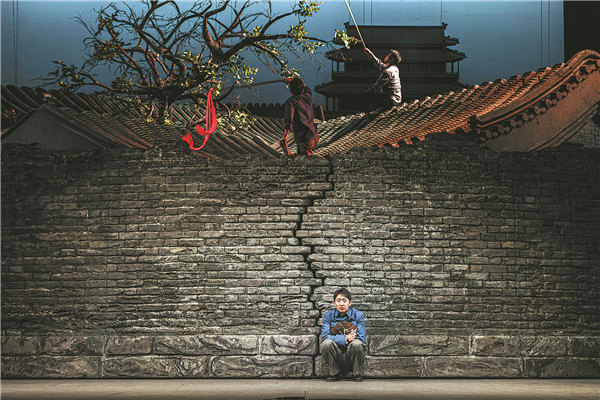Past performance


The play's opening scenes feature a silhouette of Yongdingmen, or Yongding Gate. Known as the "gate of eternal stability", and originally built in 1553 during the Ming Dynasty (1368-1644), it signifies that the nation remains stable and safe. It was rebuilt in 2004 and serves as a landmark sitting at the southernmost point of Beijing's 7.8-kilometer-long central axis — the line running through the middle of the capital.
In Chinese, yongdingmen li refers to the area inside the gate, where people used to live in courtyards tucked away in hutong, or narrow alleys — layouts distinctively vernacular to old Beijing.
The characters' backgrounds and dialogues are rooted in Beijing's real-life history, adding depth and authenticity to the storytelling. These historical touches, along with the play's nuanced characterizations, create a rich tapestry of the city's past. Scenes featuring old Beijing life, the local dialect and musical elements such as Peking Opera — a 200-year-old art form popular in the capital — appear in the play.
The scriptwriter, Liu Jinyun, says he started to write Yongdingmen Li over a decade ago. That was after he was commissioned by the Beijing People's Art Theatre to adapt Zhang Ce's suspense novel, No Regrets, into a play. Liu is known for plays including Uncle Doggie's Nirvana, which was codirected by Lin and premiered in 1986, and Ruan Lingyu, also directed by Lin and Ren Ming (1960-2022).
"I have a vivid memory of Beijing from the 1950s to '80s — the 30 years that the novel portrays," says Liu, 86, who graduated from Peking University with a major in Chinese language and worked as a Chinese teacher before he joined the Beijing People's Art Theatre in 1982 as a scriptwriter.
"My own experience enabled me to portray the scenes of old Beijing. I was also intrigued by the two lead characters, whose lives changed with each decision they made."
However, plans to bring the play to the stage were dropped for more than 10 years, until veteran actor Feng Yuanzheng became the fifth president of the Beijing People's Art Theatre in 2022. Feng decided to ask Liu and the theater's director, Tang, to stage the play.





































